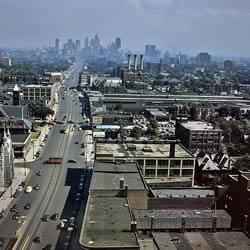The long-embattled city of Detroit has filed for bankruptcy after months of rumbling about such an action, prompting a great deal of speculation about what lies ahead for the citizens of Motor City and the state of Michigan as a whole.
Detroit, a city that has seen over a million residents depart for greener pastures as the once-bustling metropolis continues to decay, entered bankruptcy this week, leaving many residents wondering just what the future holds for the city once proudly associated with a robust automotive industry.
One thing the city has to be grateful for in the midst of its ongoing struggles: the casino industry.
Casinos provide healthy chunk of city’s tax revenue
Casino revenue is helping the city tremendously, being that its other major industry – the auto industry – primarily is based in surrounding towns and cities, meaning that Detroit sees little tax benefit from those corporations.
Detroit takes in about $11 million per month by taxing its casino properties – the MGM Grand, the Motortown Casino, and the Greektown Casino – which “is roughly the equivalent of 30% of the city’s total available cash on hand as of June 30, 2013,” according to documents filed with regard to the bankruptcy case.
The casino revenue has become an issue in the bankruptcy as Detroit’s creditors seek to get their hands on the city’s ready cash, much of which is generated by the casinos. This is money the city desperately needs, it says in the filing, as it is capable of funding the entire city’s fire department and half of the police force costs.
“With 4 of the top 10 most dangerous neighborhoods in the nation, the city needs access to [the casino] money immediately to ensure public safety and keep its police on the streets and its firefighters responding to fires,” the documents assert.
City is $18 billion in the red
Detroit’s bankruptcy filing represents the largest municipal bankruptcy in United States history. Other cities forced to take such steps in the past have included Stockton and San Bernardino in California, as well as Jefferson County in the state of Alabama.
The city of Detroit is $18 billion in debt, which interesting enough is far less than the debt currently on the shoulders of gaming behemoth Caesars Entertainment; the company is reported to be beholden to creditors for more than $20 billion.
Quicken Loans founder Dan Gilbert infusing cash into the city for revitalization
Though it may be down, there are many who are unwilling to count Detroit out. One of those people is founder of Quicken Loans, Dan Gilbert, who earlier this year became a part-owner of the Greektown Casino in downtown Detroit, the smallest of the three land-based casinos in the city.
Gilbert is pouring billions into his effort to turn Detroit around, having relocated his own employees there, renovated office buildings, and started up community initiatives aimed at changing the city’s downward trajectory.
Gilbert’s Detroit project similar to downtown Las Vegas initiative
Gilbert is not the only successful businessman to use his power and wealth to help bring a city back from the brink.
Online retail virtuoso Tony Hsieh, the founder of the clothing and shoes web site Zappos.com, has been similarly working to turn around blight in Nevada. Hsieh is undertaking a project to revamp Las Vegas’ downtown, where he will eventually relocate his company along with thousands of employees.
Zappos is in the process of renovating the old Las Vegas City Hall, a move that is motivated in part by environmental concerns and in part because using an existing structure is simply cheaper than constructing an entirely new building.

